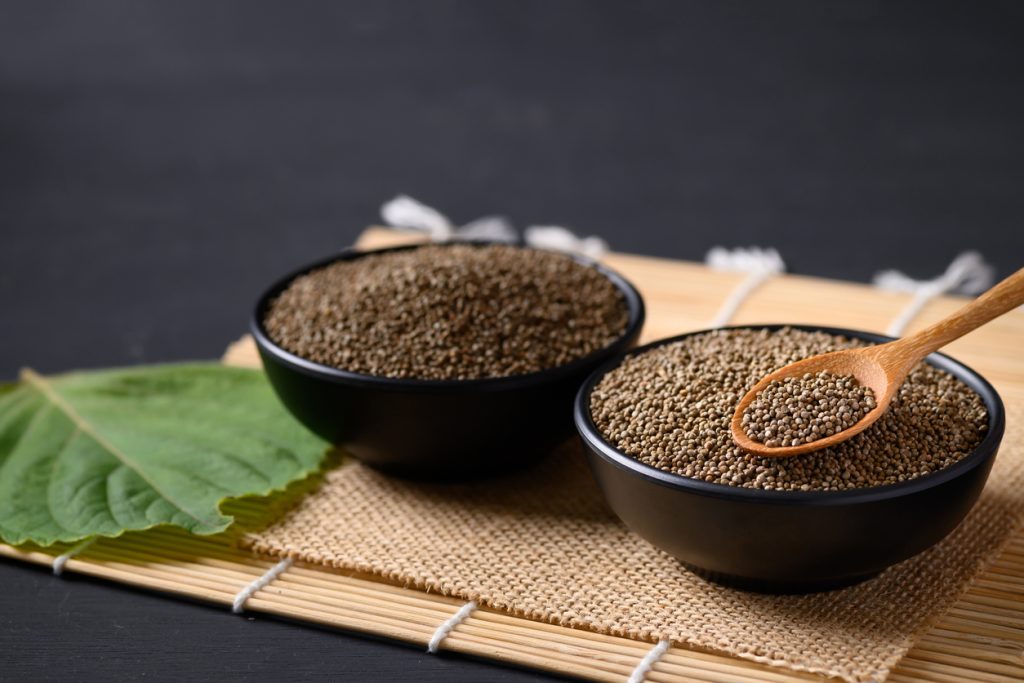Perilla Fruit (Perilla Frutescens)

What is Perilla Fruit (Perilla Frutescens)?
Perilla Fruit (zi su zi, 紫苏子), also known as Fructus Perillae, Perilla Fruit or Perilla Frutescens, refers to the seeds of the plant Perilla. Nicknamed as the Chinese Basil, Perilla is traditionally grown in China, India, Japan and other Asian countries as a crop. This crop has been used as a source of food for both humans and animals as it is rich in fat and has high amounts of protein. The leaves of the plant can be used to make Japanese pickled plums called umeboshi plums, and its seeds are a good source of omega-3 fatty acids.
Other than being used culinary, Perilla Fruit is also used medicinally. Traditionally, its leaves and seeds are used in many cultures to make medicine. However, in the West, Perilla is often seed as a weed pest that is toxic to cattle after ingestion. Perilla is also a decorative plant as it has a strong minty aroma that attracts butterflies.
In Traditional Chinese Medicine, Perilla Fruit falls under the category of ‘Warm herbs that transform phlegm and stop cough’. Such herbs can address Stagnation of fluids, which becomes pathological phlegm when it accumulates. Warm in nature, Perilla Fruit can help individuals with too much Cold in their body, such as those experiencing a Yin Excess or a Yang Deficiency, to restore a harmonious yin-yang balance. Pungent in taste, Perilla Fruit can promote the circulations of qi and body fluids. In particular, the herb can target the Lungs.
Functions and Benefits of Perilla Fruit (Perilla Frutescens)
Traditional Chinese Medicine (TCM) shows that Perilla Fruit has the following health benefits.
Perilla Fruit can direct qi downwards to resolve phlegm, which can relieve cough and dyspnea. For cough and dyspnea caused by the adverse rising of qi and phlegm obstruction manifested as oppression in the chest and poor appetite, the herb is often combined with White Mustard Seeds (白芥子, bai jie zi) and Radish Seeds (莱菔子, lai fu zi).
With properties that can moisten intestines to relax bowels, Perilla Fruit can direct qi downwards to promote bowel movements. The herb is thus effective in treating constipation caused by Dryness in the intestines, and is usually combined with lubricant laxatives such as Hemp Seeds (火麻仁, huo ma ren) and Trichosanthes Seeds (瓜蒌仁, gua lou ren) to enhance its effects.
Modern studies have found that Perilla Fruit contains a compound called Rosmarinic acid, which provides anti-inflammatory benefits that reduce allergy symptoms. For example, an animal study found that Perilla extracts were able to reduce allergy symptoms such as runny nose and red, watery eyes. The herb may also contain compounds that may have anti-cancer properties. In addition, Perilla Frutescens may help to manage autoimmune conditions and boost immunity.
Perilla Fruit may help to counter emotional disturbances such as stress and depression as well. A study found that the use of Perilla essential oil resulted in decreased symptoms of stress. The powerful antioxidant properties in Perilla Frutescens also has a major effect on our dopamine centers to promote happiness. Perilla Frutescens may also help to manage autoimmune conditions such as rheumatoid arthritis, lupus and asthma. However, the above observations still require further research to be substantiated.
The antioxidant properties in Perilla Frutescens can help to reduce oxidative stress and combat free radical damage. This can thus fight signs of aging and prevent chronic diseases. Fatty acids in Perilla Frutescens can also manage joint pain and inflammation to relieve achy and swollen joints.
Perilla Frutescens can help to promote heart health by lowering cholesterol levels and the risk of heart diseases. This makes it a great herb to prevent diseases such as heart attacks, strokes and atherosclerosis. The flavonoids in the herb can also relieve signs of stomach discomfort such as bloating, nausea and inflammation in the stomach.
Perilla Frutescens contains large amounts of Luteolin, which can reduce dental cavities and prevent the growth of detrimental bacteria in the mouth.

How to Use Perilla Fruit (Perilla Frutescens)
The recommended daily dosage of Perilla Fruit is 5 – 10g.
Perilla Fruit is available in many herbal stores as supplements, in forms such as powder or pills.
Other than being used as medicine and supplements, Perilla Fruit may also be used as food flavouring.
Cautions and Side Effects of Perilla Fruit (Perilla Frutescens)
Perilla Frutescens should not be used by individuals who are experiencing diarrhea caused by Qi Deficiency, cough and dyspnea caused by Yin Deficiency, or chronic cough.
It is also not recommended for individuals with weak digestive abilities to take this herb.
Summary
Here is a summary for Perilla Fruit (Perilla Frutescens):
- Herb name (Chinese): 紫苏子
- Herb name (Pin Yin): zǐ sū zǐ
- Herb name (English): Perilla Fruit
- Herb name (Botanical): Fructus Perillae
- Origin of species: Perilla frutescens (L.) Britt.
- Part(s) of herb used: Fruit
- Geo-specific habitat(s): Jiangsu, Anhui, Henan
- Taste(s) & Properties: Administrates the Lung and large intestine meridians
- Actions: Eases coughs with phlegm and symptoms of breathlessness; Relieves constipation
References
Ahmed, H. M. (2018). Ethnomedicinal, phytochemical and pharmacological investigations of Perilla frutescens (L.) Britt. Molecules, 24(1), 102. [Accessed on 19th December 2022]
Dhyani, A., Chopra, R., & Garg, M. (2019). A review on nutritional value, functional properties and pharmacological application of perilla (Perilla frutescens L.). Biomedical and Pharmacology Journal, 12(2), 649-660.[Accessed on 19th December 2022]
Makino, T., Furuta, Y., Wakushima, H., Fujii, H., Saito, K. I., & Kano, Y. (2003). Anti‐allergic effect of Perilla frutescens and its active constituents. Phytotherapy Research, 17(3), 240-243.[Accessed on 19th December 2022]
Share this article on
